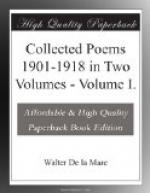BANQUO
What dost thou here far from thy native place?
What piercing influences of heaven have stirred
Thy heart’s last mansion all-corruptible to
wake,
To move, and in the sweets of wine and fire
Sit tempting madness with unholy eyes?
Begone, thou shuddering, pale anomaly!
The dark presses without on yew and thorn;
Stoops now the owl upon her lonely quest;
The pomp runs high here, and our beauteous women
Seek no cold witness—O, let murder cry,
Too shrill for human ear, only to God.
Come not in power to wreak so wild a vengeance!
Thou knowest not now the limit of man’s heart;
He is beyond thy knowledge. Gaze not then,
Horror enthroned lit with insanest light!
MERCUTIO
Along an avenue of almond-trees
Came three girls chattering of their sweethearts three.
And lo! Mercutio, with Byronic ease,
Out of his philosophic eye cast all
A mere flowered twig of thought, whereat—
Three hearts fell still as when an air dies out
And Venus falters lonely o’er the sea.
But when within the further mist of bloom
His step and form were hid, the smooth child Ann
Said, “La, and what eyes he had!” and
Lucy said,
“How sad a gentleman!” and Katherine,
“I wonder, now, what mischief he was at.”
And these three also April hid away,
Leaving the Spring faint with Mercutio.
JULIET’S NURSE
In old-world nursery vacant now of children,
With posied walls, familiar, fair, demure,
And facing southward o’er romantic streets,
Sits yet and gossips winter’s dark away
One gloomy, vast, glossy, and wise, and sly:
And at her side a cherried country cousin.
Her tongue claps ever like a ram’s sweet bell;
There’s not a name but calls a tale to mind—
Some marrowy patty of farce or melodram;
There’s not a soldier but hath babes in view;
There’s not on earth what minds not of the midwife:
“O, widowhood that left me still espoused!”
Beauty she sighs o’er, and she sighs o’er
gold;
Gold will buy all things, even a sweet husband,
Else only Heaven is left and—farewell youth!
Yet, strangely, in that money-haunted head,
The sad, gemmed crucifix and incense blue
Is childhood once again. Her memory
Is like an ant-hill which a twig disturbs,
But twig stilled never. And to see her face,
Broad with sleek homely beams; her babied hands,
Ever like ’lighting doves, and her small eyes—
Blue wells a-twinkle, arch and lewd and pious—
To darken all sudden into Stygian gloom,
And paint disaster with uplifted whites,
Is life’s epitome. She prates and prates—
A waterbrook of words o’er twelve small pebbles.
And when she dies—some grey, long, summer
evening,
When the bird shouts of childhood through the dusk,
’Neath night’s faint tapers—then
her body shall
Lie stiff with silks of sixty thrifty years.




